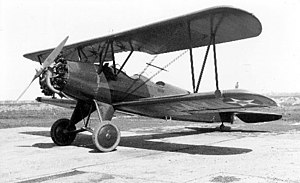Consolidated PT-3
| PT-3 | |
|---|---|
 |
|
| Consolidated PT-3 | |
| Role | Trainer |
| Manufacturer | Consolidated Aircraft Company |
| Introduction | 1927 |
| Primary user | United States Army Air Corps |
| Produced | September 1927 |
| Number built | 250 |
| Variants | Consolidated NY, Consolidated O-17 |
The Consolidated Model 2 was a training airplane used by the United States Army Air Corps, under the designation PT-3 and the United States Navy under the designation NY-1.
Seeing the success of the Navy's NY-1 modification of a PT-1 airframe, the USAAC came to the conclusion that a radial engine was indeed ideal for a trainer. It was reliable and offered a good power-to-weight ratio. Therefore one PT-1 airframe was completed as XPT-2 with a 220 hp (164 kW) Wright J-5 Whirlwind radial engine.
The XPT-3 was almost identical to the XPT-2 except for the tail, revised wing panels and different shape. 130 production PT-3 aircraft were ordered in September 1927, with one being completed as the XO-17. These were followed by 120 PT-3A aircraft with minor changes. The XPT-3 became the XPT-5 when fitted with the Curtiss Challenger R-600 two-row six-cylinder radial engine, but was soon converted to PT-3 standard.
The PT-3 aircraft were superseded by the Boeing PT-13 Stearman starting in 1937, but a number were still operational with the Spartan Flying School in Tulsa Oklahoma into the middle of World War II.
Data from "United States Military Aircraft Since 1908" by Gordon Swanborough & Peter M. Bowers (Putnam Newy York, ) 1977, 675 pp.
General characteristics
Performance
...
Wikipedia
